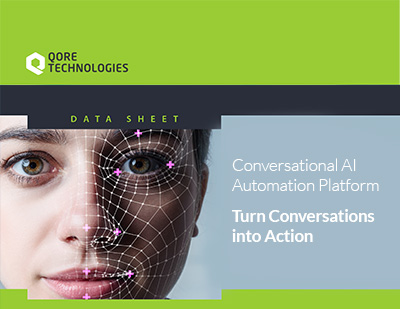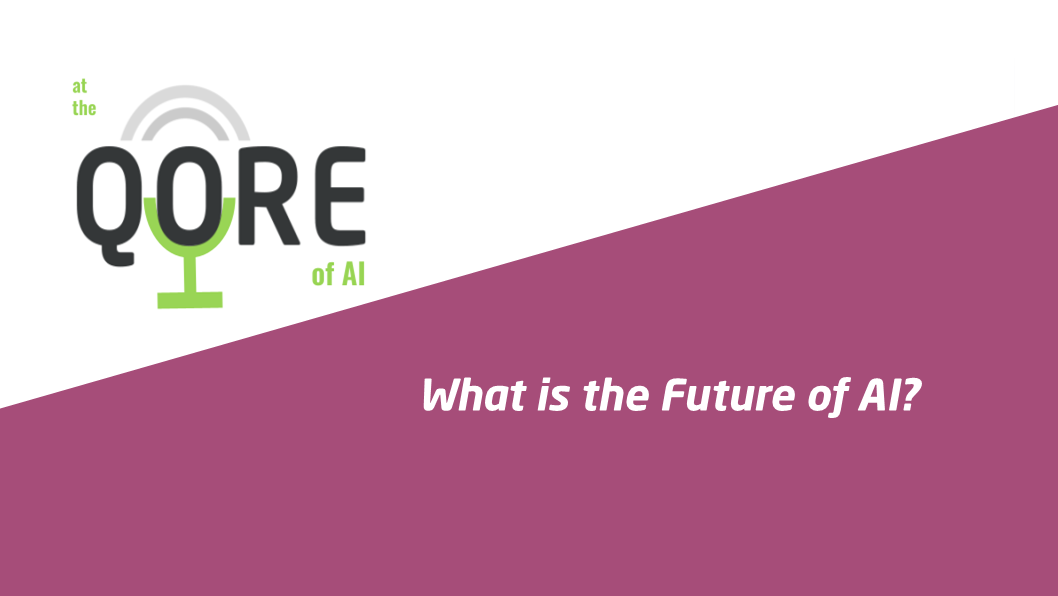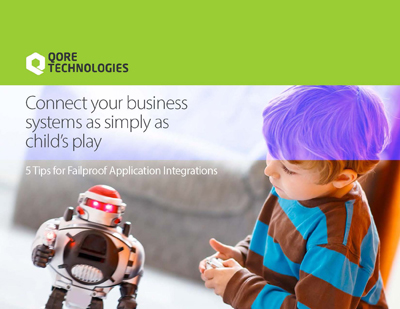Podcast host Greg Vitarelli | Podcast guests Kevin Schawinski Co-founder and CEO at Modulos AG, Dr. Andreas S. Rath CEO & Co-Founder at Ondewo, Kuba Krchak Co-CEO & Co-Founder at The MAMA AI, David Nichols CEO & Founder Qore Technologies.
June 13, 2022 | 20 min 40 sec
Welcome back to At the Qore of AI
In this episode, we revisit conversations with those entrepreneurs of AI. This time we ask them what they think is the future of their business. And finally, we reconnect with Qore Technologies’ CEO, David Nichols, who provides his insights on the future of AI.
We hope you enjoy these insights.
Kuba Krchak CEO & Co-Founder at The Mamma AI.
Kuba, as someone who’s been in this space academically and professionally for many years, with some of the biggest brands on the planet, and now with your own company, what is the next, great milestone for artificial intelligence?
That’s a tough question. I think that what we see a lot is a move to multi-purpose, neural networks. So that’s definitely something that, in recent years, research has been exploring. So, from the perspective of state-of-the-art research, these multipurpose neural networks are definitely exciting, but I think often there is a gap between the forefront of the research and the technology that’s usable for business.
And that’s something that is important for myself and for our clients. For the practicality of AI, it’s often more about finding the right techniques with the right price performance ratio, rather than these large, huge neural network models that can do a lot of things.
So, I do not necessarily think that the state-of-the-art technologies are super useful for the business itself. And I think for the business where maybe more the future lies is in more automation, the ability to create things more easily readily in scale. So maybe the concept like AI creates AI, these kinds of technology are what I think will be more important for the business than these kinds of multipurpose, large neural network models.
Dr. Andreas S. Rath CEO & Co-Founder at ODEWO
I know that at AI Summit, there’s going to be lots of conversation about big issues in the industry. As you approach this conference what are the things that you’re looking forward to hearing and what you see as the next big milestone in AI?
I’m very much looking forward to seeing how companies have approached user acceptance and customer experience, especially in the area of how they support several use cases, because every use case is a new type of conversation and every type of conversation use case requires different integration.
For example, in one use case, you integrate a medical doctorate booking appointment on one use case you integrate SAP on one use case, CRM, and so on and so forth. So the question is how do other companies solve this kind of customized dialogues, customized integration on the one hand, on the other and, how does this impact customer experience along the way?
And that has been, there has been an article published recently about the difficulty of an open source solution to produce these customized solutions is how fast these customized solutions can be produced and integrated, of course.
So every conversation of the business with a customer is slightly different. And the question is how can you make the process of creating this very easy with all the specific integrations and all the backend systems? How can you make this possible even without a data scientist or a developer?
So you need a low code, no code tool, which actually a business person understands so that you can teach the business person how to design the dialogue and you can teach the business person how to integrate in the backend system. So that these customer-company dialogues can be automated because teaching an IT person how to do dialogue design for certain business problems is difficult and teaching a business person about how to program is also a big challenge. So you need a solution, which is very fast and easy to use for a business person to design the dialogue and an integration solution with low code, no code to integrate into their specific backend systems.
As you know, every use case has a different company and different back-end systems.
Kevin Schawinski Co-founder and CEO at Modulos AG
I have a final question that’s perhaps more about what you see in the future. What do you think is the next milestone that we should be looking out for in the field of AI?
There’s some really interesting developments coming out of those foundation models those really complex, large models trained on vast data sets like, you know, the famous GPT-3, but there are others coming now as well. And, and people doing some really clever things about combining those and there’s some interesting indications that those could be very powerful combinations that they see if you pull those different types of foundation models together, you’re going to end up with something that approaches being general but remains to be seen. I’m excited to watch it.
A question that comes up frequently is how do I build fair AI?
Well, first you need to decide what fairness means in your context, but once you know that you can then take the data-centric, AI approach. To make sure your model is as fair as it can be given the data and that you manage this trade-off between how accurate a model is, and what the performance of the model is versus how fair it is.
And that again, that’s a value judgment that people need to make, that we can help with, but that we can’t make for them.
And actually, the EU is about to produce major legislation, which is going to affect not just European countries, but basically, it’s going to set the defacto standard for the world like GDPR did for privacy.
And the starting point has to be what values do societies have that they want to encode? And the technology that they use, like in the end, the technology is a means to an end and it can empower and enable those values. But the societies need to be clear, what do they consider unacceptable uses of AI?
What do they want to heavily regulate? What do they want to have a light touch regulation on? And what does that regulation look like? Our approach at Modulos is that if we want to give you the tools to work on that topic by working on your data.
David. Welcome back to the podcast.
We have had wonderful conversations with you and with some emerging companies in the AI field Modulos, MAMA AI, ONDEWO… they’ve provided us details about their journey up until this point and some of the challenges that they have integrating to enterprise scale customers.
We also asked them what they felt would be the future of AI. They provided us with some fascinating perspectives. I know you have your own opinions about this.
Could you give us some insight into what you’ve heard from our guests and what you’re thinking is about the future of AI?
Absolutely.
First of all, I really appreciate the guys coming on to the podcast series and giving us the benefit of their insights.
So, Kuba from MAMA is doing natural language processing; they are really experts at that. His main takeaway is that there’s a lot of interesting things going on right now in the AI landscape, but that you really need to concentrate on the business case, generating the most value all for the smallest investment.
And that is exactly what Qore Technologies are all about. We’re about reducing the cost, reducing the risks for delivering value to customers at the end of the day. And that’s what pretty much any business wants to do and we do that by empowering AI and data science solutions to access data, drive, process automation, and scale enterprises.
Andreas from ODEWO is doing something similar, as well. They’re doing some cool stuff by providing natural, feeling conversations. They are also experts in this and Andreas in particular.
We have a lot in common with the low-code no-code approach. We also believe that is the future and the applying that to AI, as well as IT integration, that’s a win-win proposition. Andreas also hit on our key value proposition – providing access to data, and driving process automation. That is something we do for ODEWO.
If you don’t have data, you’re not able to do anything. So that’s where we solve a problem that is unique to our industry and that is not natural for the AI engineers like we have here.
Kevin from Modulos. Yeah, they are doing analytical stuff, they are strong in explainability, which is very important. And Kevin mentioned The regulation that’s coming up in the EU that should be very consequential for the entire world. I have read some of that regulation I think it’s going to be good. I think it’s correct what they are doing. They’re looking at making sure that AI works for society’s good.
So talking about AI, creating AI, that is a very exciting, theoretical prospect, but at the moment it’s people creating AI and we need to make sure that it works for society’s good because it’s just very powerful.
And so next week we’re very much looking forward to the AI Summit in London, where we will be around thousands of people interested in AI and a lot of key decision makers. The key people delivering the power of AI to the public, basically.
And this is exactly the ecosystem that we are enabling. We are about reducing costs, reducing risks. And because people are now defining AI and we’re going to be meeting those people next week, we’re really excited about talking to them about how we can work together to do that in a responsible way, to do that with lower costs, lower risks and higher value to the end customer.
That’s fantastic. David Nichols is the chief executive officer of Qore Technologies. David, it’s been a pleasure. Thank you very much. Have a great. AI Summit, next week in London, all the best for the future.
Thank you. It’s been my pleasure as well, Greg.



